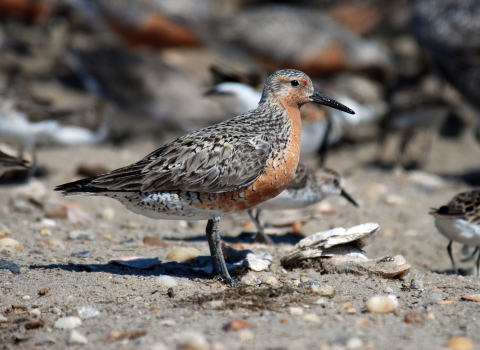“Some qualities that come naturally to women are not thought of as traditional law enforcement attributes, but are absolutely strengths. If you want a career supporting people and wildlife, don’t be afraid to be compassionate,” Help Desk Specialist Jen Foster.
“Who ya gonna call?” The LEMIS Help Desk!
When you think of the U.S. Fish and Wildlife Service (Service) Office of Law Enforcement (OLE), perhaps high-profile prosecutions or live animal seizures come to mind, but special agents and wildlife inspectors would have a very difficult time doing their jobs without the support and expertise of behind-the-scenes colleagues. Cue Jen Foster, help desk specialist for the Law Enforcement Management Information System (LEMIS) in Lakewood, Colorado. When an importer needs help with their import/export electronic paperwork or forgets their password, Jen is probably the friendly voice on the other side of the line they call for help. When a complex FOIA request comes in to headquarters, she queries countless databases to extract and compile the data. To celebrate Women’s History Month, Jen shared with us what it’s like to be a female in two male dominated fields – Information Technology (IT) and Law Enforcement.
What was your career path that brought you to the Service?
The IT route was unintentional. I was always fascinated by computers and am a self-described “cyberactivist” and nature lover. I took a few web design, coding, and SQL courses but was mainly looking for a way to conserve the environment. I was hired by Information Resources and Technology Management (IRTM) in 2000 before joining the OLE as a contractor for the past 13 years. There is no “typical” day. LEMIS help desk specialists field calls and emails, and oversee the computer program where officers write investigative reports, review policy, pull wildlife trade history, track their training, issue licenses, and so much more. We have to prioritize tasks nonstop!
Why do you believe your job makes a positive difference?
What really draws me to the Service is upholding the conservation mission. It can be pinpointed back to watching James Burke’s “After the Warming,” when I realized we have to do everything possible to prevent climate change climate change
Climate change includes both global warming driven by human-induced emissions of greenhouse gases and the resulting large-scale shifts in weather patterns. Though there have been previous periods of climatic change, since the mid-20th century humans have had an unprecedented impact on Earth's climate system and caused change on a global scale.
Learn more about climate change and the next mass extinction event. That means keeping laws like the Endangered Species Act and Migratory Bird Treaty Act intact. It is a team effort, and I get to do that with awesome people.
What are you most proud of?
One day, a new licensee called for assistance with his first shipment. He shared that he had Parkinson's disease and was not great with computers. I could tell he was frustrated and stressed to the point of tears. After I walked him through the process, we talked for a while and really made a connection. He was incredibly thankful and encouraged by the end. I am a people person, so it is moments like those I enjoy the most.
My favorite part of the job is supporting users navigate what I refer to as “The LEMIS Labyrinth!” LEMIS has over 37 modules (both internal and public facing), some of which are used more frequently than others. It is fun to collaborate with a user to find solutions. That may mean fixing a minor entry mistake or acting as a mediator to diffuse tense situations.
What advice would you give to a young woman who is thinking about pursuing a career in wildlife law enforcement?
My advice would be to think creatively about how to utilize your social skills. Do you enjoy interacting with people? Are you nurturing? A good listener? Some qualities that come naturally to women are not thought of as traditional law enforcement attributes, but are absolutely strengths. If you want a career supporting people and wildlife, do not be afraid to be compassionate.
- Interviewed and written by OLE Comms Team



